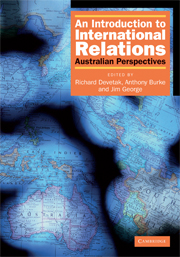Book contents
- Frontmatter
- Contents
- List of tables, figures and boxes
- List of contributors
- Preface and acknowledgments
- An introduction to international relations: the origins and changing agendas of a discipline
- 1 Theory and practice in Australian international relations: the search for identity and security
- Part 1 Theories of international relations
- Part 2 The traditional agenda: states, war and law
- Part 3 The new agenda: globalisation and global governance
- 20 Multilateral economic institutions
- 21 Global trade
- 22 Global finance
- 23 Non-state actors: multinational corporations and international non-governmental organisations
- 24 Global poverty and inequality
- 25 Globalisation and its critics
- 26 The globalisation of Islam
- 27 Global terrorism
- 28 Humanitarianism and armed intervention
- 29 Human rights
- 30 Migration and refugees
- 31 Global environmental politics
- 32 Global governance and the United Nations
- Glossary of terms
- Bibliography
- Index
- References
31 - Global environmental politics
from Part 3 - The new agenda: globalisation and global governance
- Frontmatter
- Contents
- List of tables, figures and boxes
- List of contributors
- Preface and acknowledgments
- An introduction to international relations: the origins and changing agendas of a discipline
- 1 Theory and practice in Australian international relations: the search for identity and security
- Part 1 Theories of international relations
- Part 2 The traditional agenda: states, war and law
- Part 3 The new agenda: globalisation and global governance
- 20 Multilateral economic institutions
- 21 Global trade
- 22 Global finance
- 23 Non-state actors: multinational corporations and international non-governmental organisations
- 24 Global poverty and inequality
- 25 Globalisation and its critics
- 26 The globalisation of Islam
- 27 Global terrorism
- 28 Humanitarianism and armed intervention
- 29 Human rights
- 30 Migration and refugees
- 31 Global environmental politics
- 32 Global governance and the United Nations
- Glossary of terms
- Bibliography
- Index
- References
Summary
Introduction
This chapter will introduce three of the most prominent global environmental discourses: sustainable development, environmental security and environmental justice. It begins by tracking the emergence of environmental problems as a ‘global’ political problem and traces the discursive shift from ‘limits to growth’ in the early 1970s to sustainable development in the 1980s. It then highlights the environmental challenges of the post-Cold War period and introduces the discourses of environmental justice and ecological security. This is followed by a brief introduction to the different ways in which the basic questions of global environmental politics have been addressed (or ignored) by the three broad traditions of international relations: realism, liberalism and critical theory. Finally, the chapter turns to contemporary challenges, focusing on the failure of both the US and Australia to take a leadership role in tackling the most serious global environmental problem of all – global warming.
The study of global environmental politics has emerged as a problem-oriented and multidisciplinary field of inquiry that seeks to understand (i) how and why global ecological problems arise and persist; (ii) how ecological risks are distributed through space and time; and (iii) how the global community (encompassing states and non-state actors) should respond. These three basic questions frame the field of inquiry of global environmental politics. Not only that, but they also signal the enormous political challenges facing international and transnational collective efforts to protect the earth's ecosystems and climate in a world of 190-odd sovereign states with vast disparities in capacity, resource endowments, population, cultures and levels of economic development.
- Type
- Chapter
- Information
- An Introduction to International RelationsAustralian Perspectives, pp. 362 - 372Publisher: Cambridge University PressPrint publication year: 2007



